Section A 3a-4b 课件+内嵌音频 Unit 8 Have you read Treasure Island yet (新目标八年级下册)
文档属性
| 名称 | Section A 3a-4b 课件+内嵌音频 Unit 8 Have you read Treasure Island yet (新目标八年级下册) | 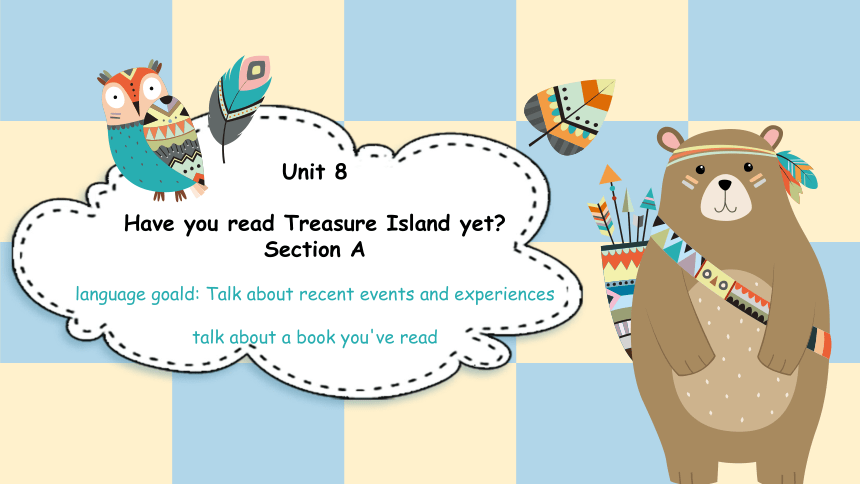 | |
| 格式 | pptx | ||
| 文件大小 | 1.5MB | ||
| 资源类型 | 试卷 | ||
| 版本资源 | 人教新目标(Go for it)版 | ||
| 科目 | 英语 | ||
| 更新时间 | 2023-05-08 14:53:17 | ||
图片预览

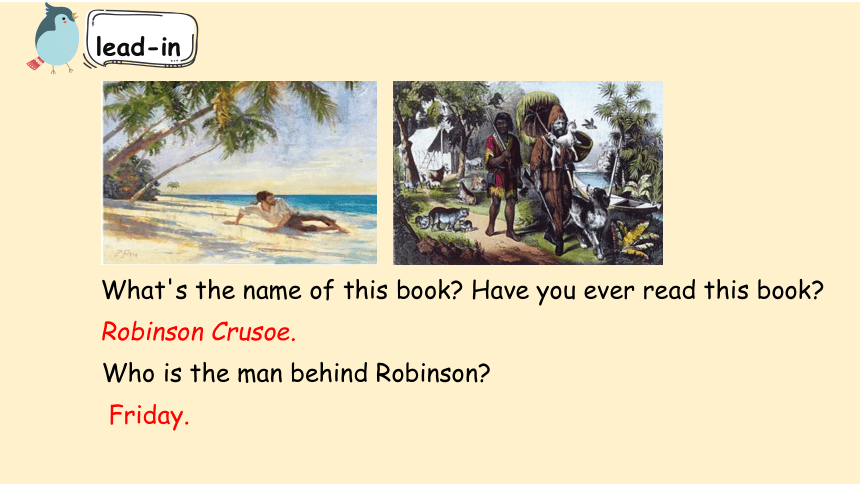
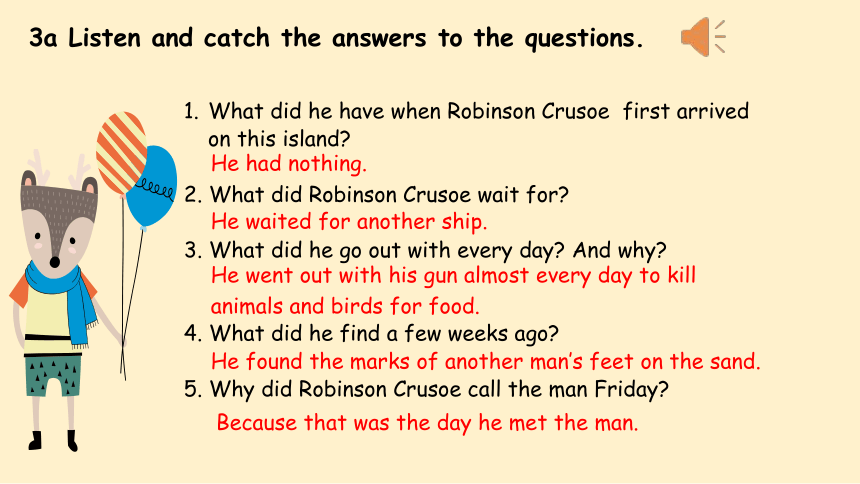
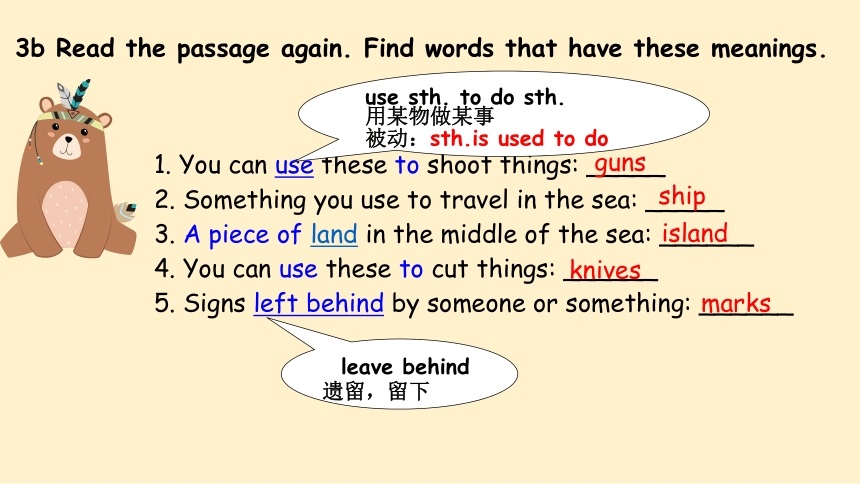
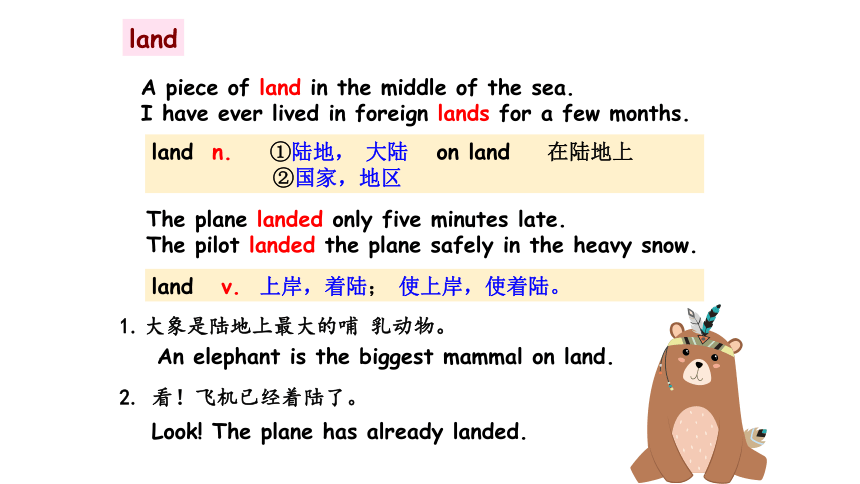
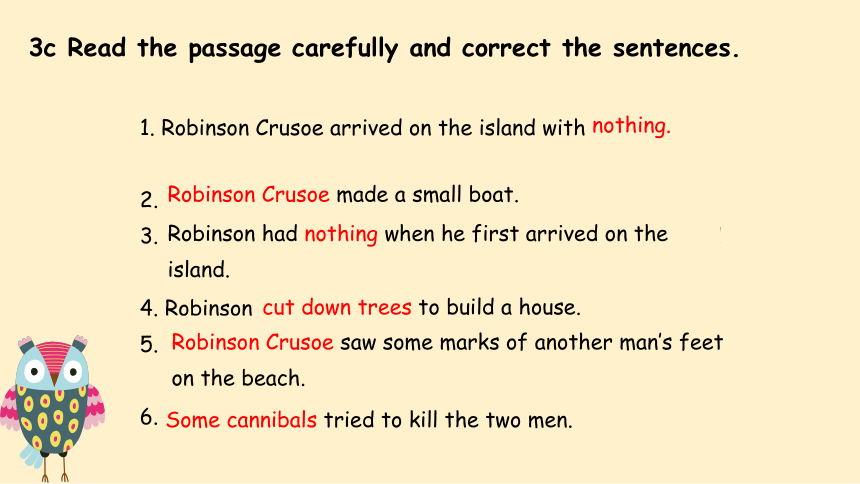
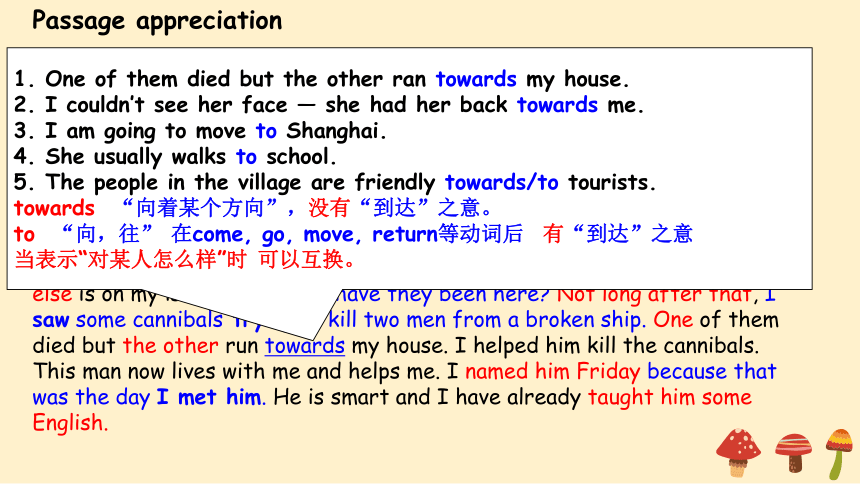
文档简介
(共14张PPT)
Unit 8
Have you read Treasure Island yet
Section A
language goald: Talk about recent events and experiences
talk about a book you've read
lead-in
What's the name of this book Have you ever read this book
Friday.
Robinson Crusoe.
Who is the man behind Robinson
3a Listen and catch the answers to the questions.
What did he have when Robinson Crusoe first arrived on this island
2. What did Robinson Crusoe wait for
3. What did he go out with every day And why
4. What did he find a few weeks ago
5. Why did Robinson Crusoe call the man Friday
He waited for another ship.
Because that was the day he met the man.
He had nothing.
He went out with his gun almost every day to kill animals and birds for food.
He found the marks of another man’s feet on the sand.
3b Read the passage again. Find words that have these meanings.
1. You can use these to shoot things: _____
2. Something you use to travel in the sea: _____
3. A piece of land in the middle of the sea: ______
4. You can use these to cut things: ______
5. Signs left behind by someone or something: ______
guns
ship
island
knives
marks
leave behind
遗留,留下
use sth. to do sth.
用某物做某事
被动:sth.is used to do
land
A piece of land in the middle of the sea.
I have ever lived in foreign lands for a few months.
land n. ①陆地, 大陆 on land 在陆地上
②国家,地区
land v. 上岸,着陆; 使上岸,使着陆。
2. 看!飞机已经着陆了。
An elephant is the biggest mammal on land.
Look! The plane has already landed.
The plane landed only five minutes late.
The pilot landed the plane safely in the heavy snow.
大象是陆地上最大的哺 乳动物。
3c Read the passage carefully and correct the sentences.
1. Robinson Crusoe arrived on the island with enough food and drink.
2. Friday made a small boat.
3. Robinson had some food and tools when he first arrived
on the island.
4. Robinson used the ship to build a house.
5. Friday saw some marks of another man’s feet on the
beach.
6. Robinson tried to kill the two men.
nothing.
Robinson Crusoe made a small boat.
Robinson had nothing when he first arrived on the island.
cut down trees to build a house.
Some cannibals tried to kill the two men.
Robinson Crusoe saw some marks of another man’s feet on the beach.
Passage appreciation
When I first arrived on this island, I had nothing. But I've found the ship
and made a small boat. I have brought back many things I can use--food and drink, tools, knives and guns. Although I have lost everything, I haven't lost my life. So I will not give up and I will wait for another ship. I have already cut down trees and built a house. I go out with my gun almost every day to kill animals and birds for food. I'm even learning to grow fruit and vegetables.
A few weeks ago, I found the marks of another man's feet on the sand. Who else is on my island How long have they been here Not long after that, I saw some cannibals trying to kill two men from a broken ship. One of them died but the other run towards my house. I helped him kill the cannibals. This man now lives with me and helps me. I named him Friday because that was the day I met him. He is smart and I have already taught him some English.
1. One of them died but the other ran towards my house.
2. I couldn’t see her face — she had her back towards me.
3. I am going to move to Shanghai.
4. She usually walks to school.
5. The people in the village are friendly towards/to tourists.
towards “向着某个方向”,没有“到达”之意。
to “向,往” 在come, go, move, return等动词后 有“到达”之意
当表示“对某人怎么样”时 可以互换。
到达这个岛上
带回我能用的许多东西
3. 带着我的枪出去
4. 为了…杀死…
种植水果和蔬菜
… 的记号
在沙滩上
还有谁
9. 之后不久
10. 跑向我的房子
11.一个…另一个…
12. 给某人取名为
arrive on this island
bring back many things I can use
go out with my gun
kill … for…
grow fruit and vegetables
not long after that
run towards my house
name sb. + 名词
Find out the following expressions.
on the sand
the mark(s) of…
one… the other…
who else
Grammar Focus
4a Use the words in brackets to complete the conversations.
1. A: Would you like something to drink
B: No, thanks. _______________________.(just/ drink some tea)
2. A: I heard you lost your key. ____________________ (find)
B: No, not yet.
3. A: Do you know when Tom is leaving
B: ________________________. (already/ leave)
A: When ___________________ (leave)
B: This morning.
4. A: Is your sister going to the movies with us tonight
B: No. __________________________.(already/ see the film)
5. A: What do your parents think about our plan
B: I __________________. (not/ tell them/yet)
I have just drunk some tea
Have you found it
He has already left
did he leave
She has already seen the film
haven’t told them yet
Sally ____ (love) reading. In the morning she reads the newspaper and in the evening she reads books. She ___ already ____ (read) more than 100 different books. Her favorite kind of books is science fiction. She is interested in science and technology and loves to imagine what the world ______ (be) like in 50 years. She _______ (finish) reading a book about robots last week and _________ (write) a book report about it next week for her French class. Every time she is in the library, Sally looks at the many books she __________ (not read) yet and she can’t wait to read them.
loves
has
read
will be
科幻小说
4b Fill in the blanks with the correct forms of the words.
finished
will write
hasn’t read
can’t wait to do sth. 迫不及待地做某事
can’t help doing sth. 情不自禁地做某事
can’t stand doing sth. 不能容忍做某事
The frog can live both on l____ and in water.
The students ran t_______ the playground after class.
How time flies! I ______ already ______ (be) here for two weeks.
The police are looking for the thief according to the signs ___ (leave) behind by him.
What else do you need (改同义句)
and
owards
have been
left
What other things do you need
Feedback
到达这个岛上
带回我能用的许多东西
3. 带着我的枪出去
4. 为了…杀死…
种植水果和蔬菜
在沙滩上
7. 之后不久
8. 跑向我的房子
9. 给某人取名为
10. 一块陆地/在陆地上
11.用某物做某事
12. … 的记号
13. 遗忘,留下
14. 迫不及待做某事
arrive on this island
bring back many things I can use
go out with my gun
kill … for…
grow fruit and vegetables
not long after that
run towards my house
name sb. + 名词
a piece of land/on land
on the sand/ on the beach
use sth. to do sth.
the mark(s) of…
leave behind
Summary
can't wait to do sth.
1. --Where is your mom -- He ___________ the park.
2. My friends ___________ America twice.
______ you ever _______ the Great Wall
How long _____ you ______ Er Wai
My sister ___________ the shop. She will be
back in two hours.
6. How long _____ he _____ ____ this city
7. Where_____ he _____ I have something to tell him.
has gone to
have been to
Have
been to
have
been in
has gone to
Feedback 反馈练习
has
been in
has
gone
1. I have been to Europe twice.
2. Where is Jim – He has gone to England.
3. Lily has been in Luoyang for five years.
我去过欧洲两次。(已经回来了)
吉姆在哪里? 他去英国了。(现在不在这里)
莉莉来洛阳已经5年了。(待在一个地方一段时间了)
have / has been (to)…
have / has gone (to)…
have / has been (in/at )… here/there/home 等地点副词,前不加介词
“曾到过某地”(现在回来了)后接次数,表示“去过…多少次”
“已经到某地去了”(现在不在说话处)只用于第三人称。
“在某地呆有多久”(在某地)后接for或since引导的时间状语(用how long提问),表示“在某地多久”
Unit 8
Have you read Treasure Island yet
Section A
language goald: Talk about recent events and experiences
talk about a book you've read
lead-in
What's the name of this book Have you ever read this book
Friday.
Robinson Crusoe.
Who is the man behind Robinson
3a Listen and catch the answers to the questions.
What did he have when Robinson Crusoe first arrived on this island
2. What did Robinson Crusoe wait for
3. What did he go out with every day And why
4. What did he find a few weeks ago
5. Why did Robinson Crusoe call the man Friday
He waited for another ship.
Because that was the day he met the man.
He had nothing.
He went out with his gun almost every day to kill animals and birds for food.
He found the marks of another man’s feet on the sand.
3b Read the passage again. Find words that have these meanings.
1. You can use these to shoot things: _____
2. Something you use to travel in the sea: _____
3. A piece of land in the middle of the sea: ______
4. You can use these to cut things: ______
5. Signs left behind by someone or something: ______
guns
ship
island
knives
marks
leave behind
遗留,留下
use sth. to do sth.
用某物做某事
被动:sth.is used to do
land
A piece of land in the middle of the sea.
I have ever lived in foreign lands for a few months.
land n. ①陆地, 大陆 on land 在陆地上
②国家,地区
land v. 上岸,着陆; 使上岸,使着陆。
2. 看!飞机已经着陆了。
An elephant is the biggest mammal on land.
Look! The plane has already landed.
The plane landed only five minutes late.
The pilot landed the plane safely in the heavy snow.
大象是陆地上最大的哺 乳动物。
3c Read the passage carefully and correct the sentences.
1. Robinson Crusoe arrived on the island with enough food and drink.
2. Friday made a small boat.
3. Robinson had some food and tools when he first arrived
on the island.
4. Robinson used the ship to build a house.
5. Friday saw some marks of another man’s feet on the
beach.
6. Robinson tried to kill the two men.
nothing.
Robinson Crusoe made a small boat.
Robinson had nothing when he first arrived on the island.
cut down trees to build a house.
Some cannibals tried to kill the two men.
Robinson Crusoe saw some marks of another man’s feet on the beach.
Passage appreciation
When I first arrived on this island, I had nothing. But I've found the ship
and made a small boat. I have brought back many things I can use--food and drink, tools, knives and guns. Although I have lost everything, I haven't lost my life. So I will not give up and I will wait for another ship. I have already cut down trees and built a house. I go out with my gun almost every day to kill animals and birds for food. I'm even learning to grow fruit and vegetables.
A few weeks ago, I found the marks of another man's feet on the sand. Who else is on my island How long have they been here Not long after that, I saw some cannibals trying to kill two men from a broken ship. One of them died but the other run towards my house. I helped him kill the cannibals. This man now lives with me and helps me. I named him Friday because that was the day I met him. He is smart and I have already taught him some English.
1. One of them died but the other ran towards my house.
2. I couldn’t see her face — she had her back towards me.
3. I am going to move to Shanghai.
4. She usually walks to school.
5. The people in the village are friendly towards/to tourists.
towards “向着某个方向”,没有“到达”之意。
to “向,往” 在come, go, move, return等动词后 有“到达”之意
当表示“对某人怎么样”时 可以互换。
到达这个岛上
带回我能用的许多东西
3. 带着我的枪出去
4. 为了…杀死…
种植水果和蔬菜
… 的记号
在沙滩上
还有谁
9. 之后不久
10. 跑向我的房子
11.一个…另一个…
12. 给某人取名为
arrive on this island
bring back many things I can use
go out with my gun
kill … for…
grow fruit and vegetables
not long after that
run towards my house
name sb. + 名词
Find out the following expressions.
on the sand
the mark(s) of…
one… the other…
who else
Grammar Focus
4a Use the words in brackets to complete the conversations.
1. A: Would you like something to drink
B: No, thanks. _______________________.(just/ drink some tea)
2. A: I heard you lost your key. ____________________ (find)
B: No, not yet.
3. A: Do you know when Tom is leaving
B: ________________________. (already/ leave)
A: When ___________________ (leave)
B: This morning.
4. A: Is your sister going to the movies with us tonight
B: No. __________________________.(already/ see the film)
5. A: What do your parents think about our plan
B: I __________________. (not/ tell them/yet)
I have just drunk some tea
Have you found it
He has already left
did he leave
She has already seen the film
haven’t told them yet
Sally ____ (love) reading. In the morning she reads the newspaper and in the evening she reads books. She ___ already ____ (read) more than 100 different books. Her favorite kind of books is science fiction. She is interested in science and technology and loves to imagine what the world ______ (be) like in 50 years. She _______ (finish) reading a book about robots last week and _________ (write) a book report about it next week for her French class. Every time she is in the library, Sally looks at the many books she __________ (not read) yet and she can’t wait to read them.
loves
has
read
will be
科幻小说
4b Fill in the blanks with the correct forms of the words.
finished
will write
hasn’t read
can’t wait to do sth. 迫不及待地做某事
can’t help doing sth. 情不自禁地做某事
can’t stand doing sth. 不能容忍做某事
The frog can live both on l____ and in water.
The students ran t_______ the playground after class.
How time flies! I ______ already ______ (be) here for two weeks.
The police are looking for the thief according to the signs ___ (leave) behind by him.
What else do you need (改同义句)
and
owards
have been
left
What other things do you need
Feedback
到达这个岛上
带回我能用的许多东西
3. 带着我的枪出去
4. 为了…杀死…
种植水果和蔬菜
在沙滩上
7. 之后不久
8. 跑向我的房子
9. 给某人取名为
10. 一块陆地/在陆地上
11.用某物做某事
12. … 的记号
13. 遗忘,留下
14. 迫不及待做某事
arrive on this island
bring back many things I can use
go out with my gun
kill … for…
grow fruit and vegetables
not long after that
run towards my house
name sb. + 名词
a piece of land/on land
on the sand/ on the beach
use sth. to do sth.
the mark(s) of…
leave behind
Summary
can't wait to do sth.
1. --Where is your mom -- He ___________ the park.
2. My friends ___________ America twice.
______ you ever _______ the Great Wall
How long _____ you ______ Er Wai
My sister ___________ the shop. She will be
back in two hours.
6. How long _____ he _____ ____ this city
7. Where_____ he _____ I have something to tell him.
has gone to
have been to
Have
been to
have
been in
has gone to
Feedback 反馈练习
has
been in
has
gone
1. I have been to Europe twice.
2. Where is Jim – He has gone to England.
3. Lily has been in Luoyang for five years.
我去过欧洲两次。(已经回来了)
吉姆在哪里? 他去英国了。(现在不在这里)
莉莉来洛阳已经5年了。(待在一个地方一段时间了)
have / has been (to)…
have / has gone (to)…
have / has been (in/at )… here/there/home 等地点副词,前不加介词
“曾到过某地”(现在回来了)后接次数,表示“去过…多少次”
“已经到某地去了”(现在不在说话处)只用于第三人称。
“在某地呆有多久”(在某地)后接for或since引导的时间状语(用how long提问),表示“在某地多久”
同课章节目录
- Unit 1 What's the matter?
- Section A
- Section B
- Unit 2 I'll help to clean up the city parks.
- Section A
- Section B
- Unit 3 Could you please clean your room?
- Section A
- Section B
- Unit 4 Why don't you talk to your parents?
- Section A
- Section B
- Unit 5 What were you doing when the rainstorm came
- Section A
- Section B
- Review of Units 1-5
- Unit 6 An old man tried to move the mountains.
- Section A
- Section B
- Unit 7 What's the highest mountain in the world?
- Section A
- Section B
- Unit 8 Have you read Treasure Island yet?
- Section A
- Section B
- Unit 9 Have you ever been to a museum?
- Section A
- Section B
- Unit 10 I've had this bike for three years.
- Section A
- Section B
